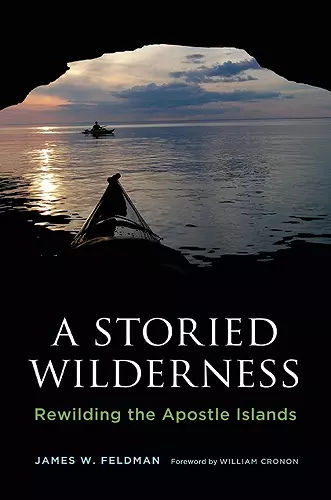A Storied Wilderness
Rewilding the Apostle Islands
Format:Paperback
Publisher:University of Washington Press
Published:26th Feb '13
Currently unavailable, and unfortunately no date known when it will be back

Feldman's book is at once a model of local environmental history and a superb history of the conceptual and political landscape of wilderness. -- James Morton Turner, author of The Promise of Wilderness: A History of American Environmental Politics This book has a specific geographic focus but it is relevant to the entire park system and to wilderness--for they are the product of the choices we have made in our relationships with nature. -- David Louter, author of Windshield Wilderness: Cars, Roads, and Nature in Washington's National Parks Long before it became a place for pleasure, the sylvan paradise that is today's Apostle Islands National Lakeshore was logged, farmed, quarried, lived upon, and loved by people whose footprints have largely disappeared. Jim Feldman makes the important point that history and nature together have shaped this once-again wild place, and we should not miss those stories for the trees. -- Dennis McCann, longtime Milwaukee Journal Sentinel travel writer
Traces the complex history of human interaction with the Apostle Islands
The Apostle Islands are a solitary place of natural beauty, with red sandstone cliffs, secluded beaches, and a rich and unique forest surrounded by the cold, blue waters of Lake Superior. But this seemingly pristine wilderness has been shaped and reshaped by humans. The people who lived and worked in the Apostles built homes, cleared fields, and cut timber in the island forests. The consequences of human choices made more than a century ago can still be read in today’s wild landscapes.
A Storied Wilderness traces the complex history of human interaction with the Apostle Islands. In the 1930s, resource extraction made it seem like the islands’ natural beauty had been lost forever. But as the island forests regenerated, the ways that people used and valued the islands changed - human and natural processes together led to the rewilding of the Apostles. In 1970, the Apostles were included in the national park system and ultimately designated as the Gaylord Nelson Wilderness.
How should we understand and value wild places with human pasts? James Feldman argues convincingly that such places provide the opportunity to rethink the human place in nature. The Apostle Islands are an ideal setting for telling the national story of how we came to equate human activity with the loss of wilderness characteristics, when in reality all of our cherished wild places are the products of the complicated interactions between human and natural history.
Watch the book trailer: https://www.youtube.com/watch?v=frECwkA6oHs
"An insightful chapter to the ongoing wilderness debates about the central role of humans in the wilderness."
-- Lissy Goralnik * Journal of Environmental Studies Vol.2 *"Environmental historians will learn much from A Storied Wilderness, but I suspect it can do more good (and perhaps be even more revelatory) if it finds its way into the hands of park planners and policymakers."
-- Kevin C. Brown * Minnesota History *"This remarkably rich and complex book would be a useful resource for courses in environmental studies, historical or environmental geography, environmental history, or tourism and recreation studies. . . . A thoroughly researched, highly readable account of the rewilding of a landscape. Summing Up: highly recommended."
* ChoiISBN: 9780295992921
Dimensions: unknown
Weight: 544g
320 pages